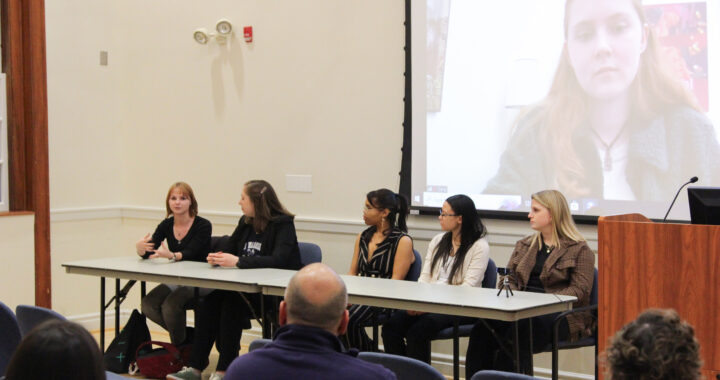Ecology Club Seeks Greener Campus
4 min readBy BRITTANY DEVRIES
For some students at the University of Mary Washington, concern for the environment goes far beyond recycling duty in the residence halls. Through an Energy Conservation Initiative proposal, students in the Ecology Club have suggested that the entire University should make a bigger effort in helping to conserve the environment.
Sophomore Hilary Lufkin, president of the Ecology Club, explained that the club brought attention to this need for campus energy efficiency last week through a two-fold event called Green Week.
“We had Green Week to raise awareness about student involvement in energy conservation on campus,” Lufkin said. “A lot of people helped plan and run events.”
With Lufka, eight UMW students also attended the Virginia Youth Energy Summit at James Madison University in November. It was during this conference that the club got the idea for an energy proposal at UMW.
“I thought, ‘Let’s do this on our campus,’ and we started planning,” Lufkin said.
Senior Tessa Merna, co-chair for the events portion of Green Week, helped organize four events to raise interest on campus. A performance by all-student band Junk Science, featuring free refreshments, kicked off Green Week, attracting a number of students on campus walk. A viewing of Al Gore’s “An Inconvenient Truth,” a documentary on global warming, was held that Thursday evening. On Sunday morning, the club also held a “Fair Trade Tea and Coffee Party” in the Virginia Hall lobby.
The most informational event of the week was on Wednesday afternoon, when guest speaker Dick Ball, energy chair of the Virginia Sierra Club, gave a presentation on global warming and energy conservation. Ball summarized the harmful influence of carbon dioxide emissions on the environment.
“Carbon dioxide not only changes the atmospheric temperature,” he said, “but it is also the biggest contributor to ocean acidification.”
Ball went on to explain that through the naturally occurring carbon cycle, greenhouse gases like carbon dioxide are constantly being emitted into the atmosphere, biosphere, and oceans; these gases then radiate energy that is absorbed as heat back into the earth’s surface, facilitating global temperatures without causing any harm. However, the contribution of human-induced greenhouse gases (released, for instance, through burning fossil fuels or deforestation) into the air raises the concentration of gas emissions, which not only increases the global temperatures but the rate at which those temperatures rise.
“There are other gases than CO2, but the rate at which CO2 is being released [into the environment] continues to increase,” Ball said.
Besides the current concerns regarding greenhouse gases, the guest speaker delivered projection slides and stories explaining how both businesses and individuals can incorporate short term and long term methods of energy efficiency and renewables into their lifestyles.
Freshman Peter Ceo, who attended the presentation, was interested in the role that government plays in environmental issues.
“It is ultimately up to the politicians to enforce [this knowledge],” Ceo said. “The more people that are informed and show concern, the higher a priority our representatives will hold it to be.”
Just last week, a breakthrough study confirmed that the excess of greenhouse gases in the atmosphere, emitted when humans burn fossil fuels like coal and gas, is the cause of global warming. The gases will continue to destroy the climate unless, as scientists hope, people begin doing things differently to prevent further damage.
Potentially negating that hope is what Ball called a ‘tipping point.’
“As a scientist, we know that there might be a point where nothing can be done,” he said. “[It is] the point where you wait too long and you can’t stop it.”
Proposing that UMW initiates its own steps towards cleaner energy before anything tips over, the Ecology Club paralleled its events schedule with an information booth and petition set up at the Eagles Nest. Each day, students could sign a petition supporting the effort in adopting an energy conservation initiative on campus.
“Our goal is 1,000 signatures,” Lufka said. “Then we hope to take it to Senate [for approval].”
Through the help of Doris Whitfield, member of the Rappahannock chapter of the Virginia Sierra Club (RSG) and UMW alumnus of ‘53, RSG joined forces with UMW’s Ecology Club about five years ago.
This joint organization collaborative, which gives the ecology club a perspective outside of campus, motivates its members; it is this kind of momentum that Tessa Merna hopes other students will gain through Green Week.
“Students need to be more informed about the environment and learn about what [they] can do to help,” Merna said.
Lufka agrees that students can help out even when the University might not.
“Signing the petition is great, but more so it is an empowerment,” Lufka said. “I want students to realize they are part of a bigger movement. People have a responsibility towards [caring for] this environment, and there is a lot they can do.”











